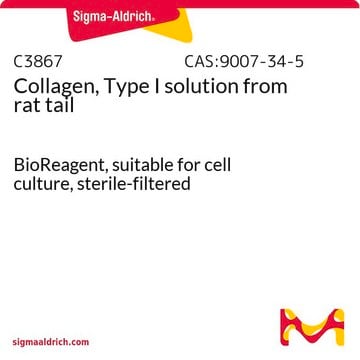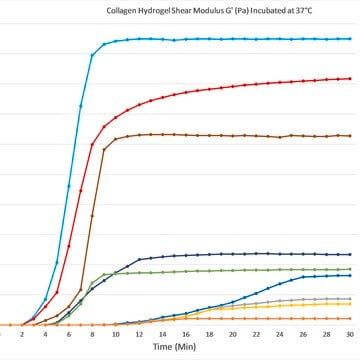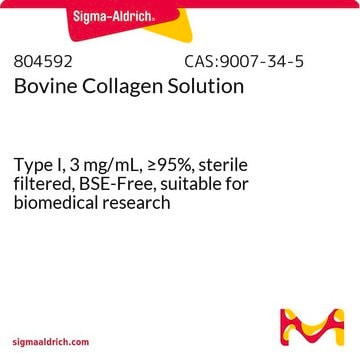5133
Bovine Collagen Type I & III
from bovine hide, liquid, 10 mg/mL, suitable for cell culture, used for 3D hydrogel formation, FibriCol®
Sinónimos:
Sepharose 4B
About This Item
Productos recomendados
Nombre del producto
FibriCol®, Collagen solution from Bovine hide, 97% Type I with the remainder of Type III collagen, suitable for cell culture
biological source
(Collagen solution from Bovine hide)
Quality Level
sterility
sterile-filtered
assay
>99% (SDS-PAGE Electrophoresis – Silver Stain, SDS-PAGE)
form
solution
packaging
pkg of 20 mL
technique(s)
cell culture | mammalian: suitable
solubility
water: miscible
shipped in
wet ice
storage temp.
2-8°C
General description
It is ideal for applications where high concentrations of collagen are needed. FibriCol® collagen is provided in a 20 mL volume and is contained in user-friendly packaging for use and storage. FibriCol® is sterile filtered and is supplied as a ready to use solution.
Application
- in the preparation of liposome-loaded co-gels to treat methicillin-resistant Staphylococcus aureus (MRSA) infections in vitro and in vivo
- in the preparation of gelatin-methacrylate (gelMA)-collagen gels to study the effects of stiffness and fiber density on cellular behavior in breast cancer cell lines
- in the preparation of collagen hydrogels to study its effects on macrophage response in partial thickness abdominal wall defect rat models
Legal Information
Storage Class
12 - Non Combustible Liquids
wgk_germany
nwg
flash_point_f
Not applicable
flash_point_c
Not applicable
Elija entre una de las versiones más recientes:
Certificados de análisis (COA)
¿No ve la versión correcta?
Si necesita una versión concreta, puede buscar un certificado específico por el número de lote.
¿Ya tiene este producto?
Encuentre la documentación para los productos que ha comprado recientemente en la Biblioteca de documentos.
Artículos
The extracellular matrix (ECM) and its attachment factor components are discussed in this article in relation to their function in structural biology and their availability for in vitro applications.
The extracellular matrix (ECM) and its attachment factor components are discussed in this article in relation to their function in structural biology and their availability for in vitro applications.
The extracellular matrix (ECM) and its attachment factor components are discussed in this article in relation to their function in structural biology and their availability for in vitro applications.
The extracellular matrix (ECM) and its attachment factor components are discussed in this article in relation to their function in structural biology and their availability for in vitro applications.
Nuestro equipo de científicos tiene experiencia en todas las áreas de investigación: Ciencias de la vida, Ciencia de los materiales, Síntesis química, Cromatografía, Analítica y muchas otras.
Póngase en contacto con el Servicio técnico